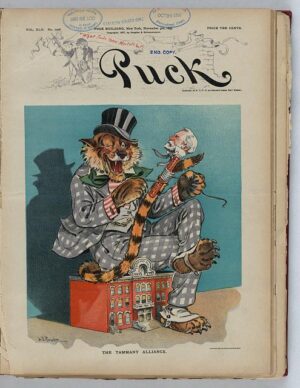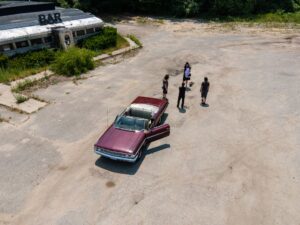The novel is titled From L.A. to Breakfast.
Football means the same thing to Southerners as Christ to Christians or crack to crack heads; sorry I put those two relationships next to one another. But the gridiron has a sanctity that just isn’t questioned. We weren’t ever asked by our parents if we wanted to play it. We were told when to show up for practice. The Stark High School Football Stadium was an eyesore. It was made out of solid concrete cracked and spotted from the weather and years, but painted gold—the color of the Mighty Mules. All in all, it looked like a spray painted turd. It had obviously aged since I played there. Fresh green grass with a few spots of brown covered the center of the stadium and a nine-foot mule wearing a football helmet and kicking a field goal with its back legs adorned the grass. It was an adorable mascot, even if the team didn’t have a kicker. The school tried to teach the mascot how to kick one year, but he destroyed half of the footballs in the school’s inventory and they had to make it a whole season with only four footballs.
We went back to the house to get Hillary before going to the stadium. When I got out of Ray’s truck at the school, I could see my breath in the air. I did miss the winter in Stark. The fencing that bordered the stadium was new and so was the scoreboard. “Johnson Heating and Cooling—Gassin’ up the Town for 40 years” was scrawled on the scoreboard. The stands were packed with people and a hum conversation floated above. The new lights blotted out the stars overhead. This was as close to a Hollywood premier as a small Southern town could get. Instead of large spotlights twirling light into the smoky sky, three men at the stadium’s entrance sat on the back of a bass boat with lights they used to attract catfish for night fishing. They twirled them up into the chilly night air. Rays of light jerked over the concession stand.
We meandered through the crowd of townspeople wearing overalls and Carhart jackets and bubble coats. The first person I spotted that I knew was Big Brother Dorian. He leaned against the fence next to one end zone with the rest of the middle-aged crowd, the sons of the guys who leaned there when I played football, just a sample of the multi-generational fence leaners who give their all for Stark football, who know what it truly means to be a Mule. They all played for Stark. The group covered the fence during the games and talked about how things were different when they played and yelled at the referees for calls that went against the home squad. They talked about how kids just weren’t as tough as they used to be. Dorian was wearing his police uniform.
“I thought you didn’t have to work tonight, big brother.”
“I don’t!” he screamed, because screaming was just his thing. It’s what he did. He was talking to one of the other guys about how running backs aren’t as mean as they used to be. “We didn’t go down the first time somebody hit us,” he said to one of the group. “We looked for hits. Not these new boys. They’re getting soft.”
“What’s with the uniform?”
“I’m proud of my job! I may not be some big time city hot shot, but I keep these streets safe, and I’m damn proud of it! I’m the reason it’s safe to sleep at night around here!”
“You got that right!” a middle-aged man with a mullet said.
“I heard that,” another added after he spit a brown liquid into the dust on the ground.
“That’s the truth if I ever heard it.” I slipped into a more Southern accent for a second. “Just the other night, Hillary heard something outside. She woke up and said, ‘Jasper, I heard something. Get up and check it out.’ And I said, ‘Hell no, baby. No need for me to get my citified ass out of this lovely bed and disturb the social order. Big Brother Dorian’s get this town on lock. Nothing happens that he doesn’t know about. He’s probably out there now.’ Were you out there, big brother?”
“Everything here is a joke to big city funny man! Mr. Hollywood!” he responded deafeningly. “And where did your ‘homey’ go?” He paused on the word homey to let me know he was making fun of Ray’s blackness.
I ignored that part.
“California, huh?” mullet man said. “I watch that one TV show ‘bout California with the ol’ ball and chain sometimes.”
“It’s just like that,” I said. “All hospitals and murders and crime scene investigation.”
“Hmmph,” one of the men in the crowd said. Seriously or not, I’m not sure.
I hugged Big Brother Dorian. And if you haven’t deduced yet, Dorian wasn’t a hugger. I wrapped my arms around him but he kept his at his side and turned his neck tightly to look at me. I kissed him on the cheek. One of the fence crew said “What the—”
I encountered a lot of people, some I remembered and some I didn’t, but they all remembered me. They asked all kinds of questions. Some thought I was playing in the NFL, some thought I was a broadcaster for a large network and one guy said he heard I owned the Minnesota Vikings. In less than ten minutes, a crowd had formed around me and the younger kids were asking for my autograph. Hillary seemed to love it. This was the happiest she’d looked since we crossed the state line. People patted me on the back and shook hands with me. “Good to see you home, son,” they said. And “Stark’s best quarterback is back home again.”
The mechanic, the very Reverend Joe Walsh and his son came up.
“Sure is good to have you home right back where you ought to be,” he said. “God works in mysterious ways. And you’re living proof of that.”
His son, Joe Jr., shook my hand like I was the first person to ever fry squash.
“Damn glad to meet you, Mr. Jasper. Your records still haven’t been broken here, and folks say they never will be. I heard you were president of the NFL Player’s Association. You still doing that?”
“No, no. I’m an agent now.”
“Oh,” he said with a hint of disappointment. “I thought you were—”
“Junior, let the man alone. He’s got business to tend to. Good to meet you Miss Hillary.” He nodded and took Junior to the bleachers.
Hill and I made our way to the bleachers. The announcer came over the loud speaker and announced that I was in attendance and back home again in Stark. A great applause erupted. Hillary’s breathing deepened. She smiled. We found Ray sitting next to Carina Baxter. Carina had a crush on me in school and sent me messages and emails from time to time. She had sex appeal something fierce, but she didn’t put up much of a fight. She was a dental hygienist in Worthington. Not that one thing had anything to do with the other. In her favorite books section on one of the networking sites, she wrote, “Eww.” She was a thin woman with subtle features and a raspy voice. The persona attached to her was anything but subtle. She played volleyball in school, never seemed to like it.
“Hey, Jazzy,” she said with a long Southern drawl. “It is so good to see you.”
“Ca-rina,” I said. For some reason I paused in between syllables and it came out sounding all fake. “You’re as radiant as ever.”
“For real? You think so? You look good, too. We have to have lunch or something. Or maybe you’ll get your teeth cleaned in the near future and I can do it. Wouldn’t that be crazy?”
“That would be crazy. Because I’ve never had a friend clean my teeth before.”
“Carina, this is my fiancé, Hillary.”
“Nice to meet you, Miss Hillary.”
Hillary glowered. “Likewise, I’m sure.”
I was still standing when Carina said, “Oh, and Katrina’s here. You remember her, right? Katrina!” she yelled three rows up. “Look, Jazzy’s home!” Everyone within hearing distance stopped their respective conversations and looked at me. Had I known how to dance a Jig, I would have. I waved like a politician. It made me feel like an ass, but it was what I did. It garnered another round of applause and made Hillary smile again.
Halftime of the game was something even I wasn’t ready for. The band came out and played “Dixie” to start things off. It wasn’t a particularly good version, but it was memorable. Most of the horns played out of tune and sounded more like cats having sex than a tribute to Southern legacy. The huge crowd loved it. A few of the older people took their hats off and placed them over their hearts. Anybody under the age of 40 continued with the conversations and barbeque sandwiches.
Three girls from the school sauntered out onto mid-field wearing different bridesmaid’s dresses. A man in overalls with a plain white t-shirt escorted the mascot, Melvin, onto the field and stopped him in front of the girls. Melvin was wearing a makeshift helmet and had a sash draped across his back. The mule had to have been 300 years old; he was the mascot when I was in school, and even though no one I asked could remember, I’m pretty sure he was the only mascot the school ever had. Mules typically live 45 or 50 years, but this one had been part of the town longer than hatred of the North. He was part of a great Stark High tradition. Each homecoming, the graduating class laid a bouquet of wheat over his back. He already had the other bouquets from the preceding years on his back and stood waiting for the next. Hillary perked up at the sight of the debutantes, probably thinking of some part of her past.
The school’s principal, who also served as the town’s accountant and fire chief, walked to midfield with a microphone and began talking. The microphone wasn’t on and for the first few seconds he stood moving his lips and gesticulating like caffeinated revival preacher. He talked until the shouts made their way down to him.
“Oh—Welcome to Stark High School’s 112th homecoming festivities,” he said. The microphone squealed a piercing whine and fans covered their ears. Ray stared at me with a look that I think said, “Welcome Home, buddy.” Of course, it very well could have said, “I drank seven beers if 14 minutes on the way here.”
“We have a bevy of high school beauties here tonight,” the school’s revered administrator on the field continued, “and we are going to crown the new Stark homecoming queen. Then, we will place the ceremonial wheat bouquet on Melvin’s back.”
Each contestant was introduced: Charmaine Butler, freshman, daughter of Earl and Linda Butler, representing senior Gerald Butler (her brother); April May, freshman, daughter of Tisdale and Monica May, representing senior Michael Stevens (of The Stevens family, the wealthiest family in town); and Donetta White, junior, daughter of William and Cornetta White, representing senior C.C. King.
The principal attempted to open a white envelope.
“And this year’s homecoming queen is . . .” He fumbled with the envelope until he dropped the microphone; it let out another squelch. “Goddamnit,” he said.
A collective groan came from the crowd. “Let us pray,” an old lady said. She grabbed the hand of the young man sitting next to her. He wasn’t praying.
“Oh,” the principal said when he finally got the letter opened. “April May, representing Michael Stevens.”
About one-third of the crowd gave raucous applause and the other two-thirds acquiesced. Last year’s queen, Dorothy Wannamaker, crowned April May and presented her with a flower arrangement of roses, Gerber daisies and fresh cut tobacco. Both girls cried. Hillary cried. I did, too, on the inside.
Michael Stevens walked onto the field in uniform with the ceremonial wheat bouquet to place on Melvin. He laid the wheat across the mule’s back and the crowd erupted. Stevens pushed his fist into the air like Jesse Owens at the 1936 Olympics in Berlin. He ran back to the portable trailer beside the field that served as the team’s locker room. The man in overalls moved to escort Melvin off the field, but Melvin held fast. The man took hold of the reins and pulled, leaning backwards to a 45-degree angle, but still no movement from Melvin. The man pulled again until he fell. A few laughs came from the crowd. He got back up and tried again, nothing. He stopped pulling, straightened himself, and hat in hand, wiped his brow with a white handkerchief. Melvin let out an awkward, penetrating guffaw and fell sideways with a bass-filled thump. The crowd gasped collectively.
“What is going on here, Jasper?” Hillary asked completely baffled.
“There’s something you don’t see every day,” Ray said.
“Oh my God,” Carina cried with Southern eloquence. “Melvin!” On a side note, this was the first time I noticed that Southerners put an extra syllable in vowel sounds. Meyl- vin.
A loud buzz emanated from the crowd while the man in overalls, the principal and the football team’s trainer surrounded Melvin. One older woman passed out into Ray’s arms. He laid her down and fanned her with his hat.
Several minutes passed. The team’s trainer, who was also caretaker of the town cemetery, checked for a pulse and tried to take the mule’s blood pressure. They even tried smelling salts. Melvin, however, was dead—no movement, no breathe, no guffaw—nothing. The smaller children in the stands began to cry as did some of the women.
“For God’s sakes, Ray,” one of the fans said. “You’re a doctor. Get out there and save Melvin.”
Ray arched his eyebrows and shook his head. “Naw,” he said. “I treated one of those things down in Summerville three years ago and got sued for malpractice. Also got a rash on my thigh I never could explain. No thanks.”
“Well—Jasper, can’t you do something? Aren’t you a doctor, too?”
“I’m afraid,” I laughed. “I’m afraid I can’t help with this one.”
Stark’s groundskeeper drove a four-wheeler out onto the field to see if they could get Melvin to the sideline. They tied him to the back of the ATV, but it didn’t move. The studded tires spun in place and slung grass and moist earth behind it, nearly covering Melvin and getting dirt on April May’s finest Sunday dress. She dropped her bouquet and ran off the field. On the sideline, she buried her head into her mother’s bosom.
Conversation sprang in the crowd again until the announcer came over the loud speaker and asked for a moment of silence for the passing mule. They played taps on the speaker system. A prayer group formed next to the concession stand lead by one of the local clergyman, a pastor who was also the town’s public relations officer. The huddle of men around the mule grew as time passed. After about half an hour, there were close to forty men standing around Melvin speculating on how to get him off the field. Both teams returned from the halftime break and were forced to stand at opposite ends of the field and watch the scene. Finally, the man in overalls decided to go home and drive his tractor back to the field. The band marched back onto the field and played a version of “How Great Thou Art” while the spectators looked on. Once again, some of the older men in the stands placed their hats over their hearts. Overalls came back with his tractor after another half an hour or so of repeated versions of one song.
They hooked Melvin to the tractor and the man in overalls started to pull. He revved the engine and the tractor jerked into gear. Melvin jerked but still didn’t move more than a few inches. The tractor reared up onto its back wheels and the man in overalls cascaded from the driver’s seat but hung on to the wheel. Some of the men in the group grabbed the man and helped him back on. On his second attempt, Melvin slid behind the tractor. Melvin had scratched a small, grassless trail in his wake. For the entire second half players from both teams had to run or jump over the tiny trench. On one play, Stark’s running back broke free down the sideline on a long run and tripped in the mule’s path. He fumbled and Reed recovered. Stark got pummeled 43-10 and the team’s winning streak ended.




